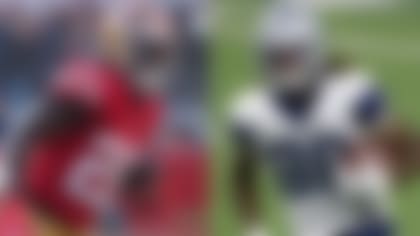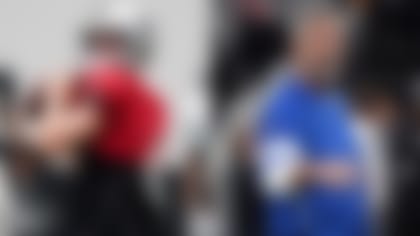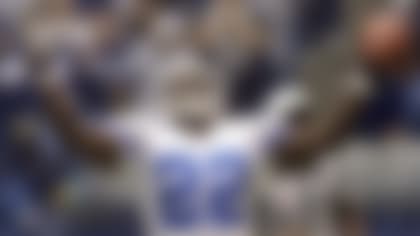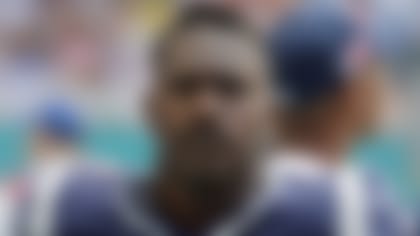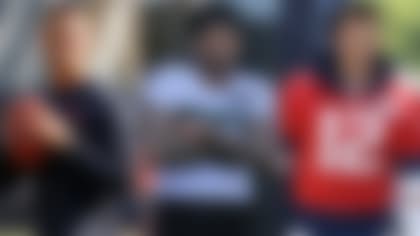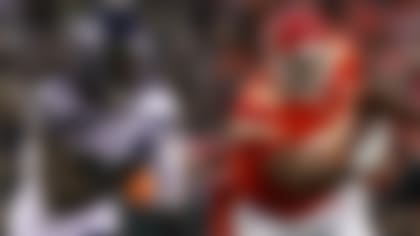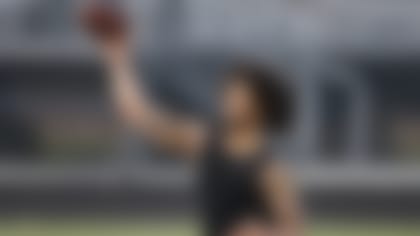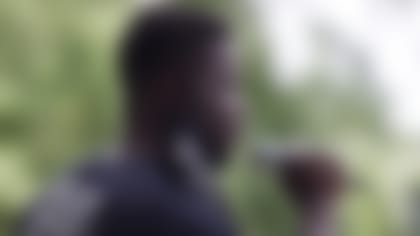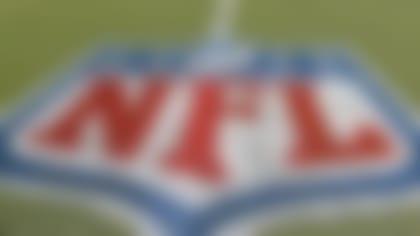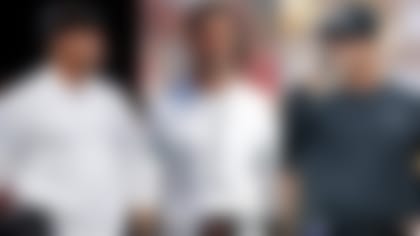In 撸先生AV.com's Press Coverage series, columnists Judy Battista, Jeffri Chadiha, Michael Silver and Jim Trotter engage in a back-and-forth discussion on a timely topic, issue or theme. In this edition, JIM TROTTER leads off a discussion on the 撸先生AV reaction during a tumultuous time in American history.
When George Floyd became the latest unarmed black man to be killed by police last week, 撸先生AV players, like many others, flooded social media with posts condemning the act, just as they had done in other high-profile instances. And yet, this time felt different because the posts did not fall largely along racial lines. They included prominent white players -- franchise quarterbacks, no less -- whose collective voices were initially absent four years ago, when Colin Kaepernick first protested police brutality against people of color by kneeling during the national anthem.
"Been thinking about the George Floyd situation and thinking of the words to say & coming up empty," Eagles quarterback Carson Wentz wrote in . "All I know is that the institutional racism in this country breaks my heart and needs to stop. Can't even fathom what the black community has to endure on a daily basis."
"My initial thoughts on the video of George Floyd made me disgusted, mad, and broken-hearted," . "Anytime someone loses their life it's a terrible thing especially when it could have been prevented. My opinions won't make a difference on how that should have been handled better, but I do think my platform can be used to help."
"Everyone deserves to feel safe & protected in their communities ...," . "It's on us to use our voices and actions to make that happen. What happened is completely unacceptable. #JusticeForFloyd"
Bengals quarterback Joe Burrow, the No. 1 overall pick in this year's 撸先生AV draft, : "The black community needs our help. They have been unheard for far too long. Open your ears, listen, and speak. This isn't politics. This is human rights."
Even more notable was the response by 49ers CEO Jed York, whose family owns the franchise. He announced Saturday night the organization is donating $1 million to "legislative priorities of the Players Coalition" in its fight for racial equality and social change. But arguably bigger than the financial pledge was the statement that accompanied it.
"Before we are able to realize impactful change," York wrote, "we must first have the courage and compassion as human beings to come together and acknowledge the problem: black men, women and children and other oppressed minorities continue to be systemically discriminated against."
On Monday, the Ravens and the Stephen & Renee Bisciotti Foundation committed to donating $1 million to support social justice reform throughout the Baltimore community.
"Like many people, I am sickened, disheartened and shaken by the acts of racism that continue to overwhelm our society. The most recent killing, involving George Floyd, is yet another tragic example of the discrimination that African-Americans face each day," Steve Bisciotti, the Ravens owner, said in a statement. "Now, more than ever, we must all strengthen our pursuit of positive change, as we stand with peaceful protesters around the country. We must all seek to understand by listening better and learning more. We must all discover new ways to unite. We must all work to break the cycle of systematic racial injustice."
These public acknowledgements represent a benchmark in the league's 101-year history. For too long, most white men in the 撸先生AV showed little public interest in joining a fight that, perhaps, they didn't see as theirs. Some expressed support in private, but remained silent beyond their locker-room doors.
That changed last week.
And while it's impossible to say what impact their words will have, there is no minimizing the significance of having both white owners with access to financial and political power and a group of prominent, influential white players -- at the most visible position in the game, no less: quarterback -- shine a spotlight on the root cause of these injustices. While none of the above statements directly called out police brutality by name, every dispatch represented a big-picture step in the right direction. If nothing else, it shows non-blacks it's OK to step out of their comfort zone and openly acknowledge racism isn't a black problem; it's a human problem that needs to be addressed.
Floyd, who was on his stomach with his hands cuffed behind his back, stopped breathing and died after an officer kneeled on the back of his neck for nearly nine minutes. Texans defensive end J.J. Watt, who is not known for wading into controversial waters, was among the first white players to speak out, calling video of the killing Tom Brady -- arguably the greatest quarterback in league history, but someone known for routinely avoiding social issues -- broke from his controlled image last month and requesting a federal investigation into the death of Ahmaud Arbery, an unarmed, young black man who was shot and killed by a white citizen in February. (Graphic video of Arbery's final moments emerged in May, bringing national attention to the story.)
The willingness of Watt and Brady -- along with other non-blacks -- to publicly join the fight makes this a sea-change moment. History has taught us that meaningful legislative and social change come from blacks and whites working together. While it's considered a given that blacks would highlight the killings, having white franchise QBs lend their voice could help empower others to step outside their comfort zone and speak up.
"People have been asking: Where are the white athletes? Where are the white voices?" Chris Long, a retired defensive lineman who was among the few white players who spoke out in 2016, told me on Sunday afternoon. "We can't ignore the franchise-quarterback thing because they're the center of attention. That's the guy who sticks around if he's any good and outlasts coaches and front-office people. People build fan bases around quarterbacks, so the quarterback element is really important. I wish it didn't come four years late, but we're getting somewhere, as far as people using their voices.
"You've got a kid in South Carolina who's the best college football player in the country, Trevor Lawrence of Clemson, who is going to be drafted 1 or 2 next year, and he's taken it upon himself to speak out. ... You've got Joe Burrow, and you see him speak out before he takes his first (撸先生AV) snap. That's going to open some doors. So if you project forward, where we were four years ago and where we are now -- as far as people lending their voices -- what's that mean for four years from now?"
That's a great launching point for Judy Battista, Jeffri Chadiha, Michael Silver and myself to dive in. We discuss: What's the significance of prominent white players speaking out on police brutality against people of color?
JUDY BATTISTA: I'm trying to be hopeful. So I want to think this represents a turning point, that the video of Floyd's death was so horrific that even normally circumspect players who sat out the Colin Kaepernick controversy and the "son of a bitch" moment were shaken out of silence, just as I hope this is finally -- finally -- a turning point for every white American who has managed to ignore previous incidents of police brutality and racism.
The savviest players also must recognize that lending their voices now will enhance the power of efforts that are already in place and working, like those of the . Joe Burrow obviously already knows he has a platform and how much good he can do with it, having used to talk about the struggle and disenfranchisement of his hometown. He crystallized why it is important for white players to speak up now when he said that the black community needs our help. A drive for social justice can't only be the responsibility of African American players. Racism isn't a black problem. It's a universal problem.
It is an uncomfortable reality -- the 撸先生AV is overwhelmingly made up of African American players, and groups like the Players Coalition have done important work and made real legislative progress in the last four years. They have forced the 撸先生AV to commit time and money. But star players are the ones who draw the most attention to any cause, and if 撸先生AV players are to maximize their impact, they need the stars to be prominent participants -- and many of the 撸先生AV's stars are white. It's long past time for more of them to speak up. And it is especially attention-getting when it is white superstars -- especially quarterbacks -- who have previously shied away from engaging on controversial topics.
What the Players Coalition has done is good work, but it is also hard, grinding, incremental work. There is not a ton of glory in the day-to-day process of creating legislation. White players can't just send a tweet; they also have to do the work. That's the next step I want to see -- that white players beyond Chris Long and a handful of others will really commit to effecting change, and will stand in there when the "stick to sports" crowd gets going again.
MICHAEL SILVER: Let's be real: This feels like a moment when we all have to take sides. There's the side of racial equality -- on which I believe, in my heart, the vast majority of us in the pro football community reside -- and there's the other side. The other side makes a lot of noise about a lot of things, but it's essentially the side of bigotry and divisiveness and hatred. There's no playing this issue down the middle, nor should there be.
The biggest reason we have to take sides at this moment is because the flames are being fanned by some of the most powerful politicians in our nation, and especially the commander in chief. The same man who galvanized 撸先生AV players to kneel en masse during the 2017 season by referring to Colin Kaepernick and fellow protesters as sons of bitches, and the same man who later described a deadly white supremacist rally in Charlottesville, Virginia, as an event that included "very fine people, on both sides" is sending out wild tweets suggesting that those protesting in the wake of Floyd's death are "thugs" and making references to shooting and death. Juxtaposed against the recent images of overwhelmingly white agitators, many of them armed, who stormed state capitols to demand the reopening of businesses amid the COVID-19 pandemic -- protesters praised by the president -- it's pretty clear what lines are being drawn, and how African Americans and their allies are being regarded by their government.
You can't wear a MAGA hat and claim to be someone who abhors racial injustice and subjugation. And you can't insist that peaceful protests are the gold standard if, when Kaepernick and others did exactly that, you blew a gasket and called them un-American.
So here we are. It makes sense to speak up and speak out for what's right and to support those in our midst who are experiencing this injustice on a much deeper level. I can understand why white players are doing so now, and I believe it's vitally important. I believe it's incumbent upon all of us who are appalled by the state of affairs -- and, obviously, this is not a new thing -- to be loud and resolute in our opposition.
And yet, I know more needs to be done, and I understand that I and others have to figure out a more comprehensive way to be part of the solution. We're appalled, but we're not the ones absorbing the bulk of the trauma; our African American brothers and sisters are. What for me is frustrating and infuriating is something that's downright terrifying to a lot of colleagues, players, coaches, talent evaluators and others whom I call friends. Unlike Jim and Jeff, and unlike Steve Wyche and Terrell Suggs and Richard Sherman and Anthony Lynn and Andrew Berry and so many others, I don't have to talk to my kids about how to handle a routine traffic stop or a "Why are you jogging through an upscale neighborhood?" interrogation that, by virtue of their skin color, could turn deadly.
Like so many others who don't truly know what it's like to be a black person in America, I want to support the cause, and I want to make it clear that racism and bigotry are intolerable. On a positive note: I've been covering the 撸先生AV for three decades, a stretch that included the riots after the Rodney King verdict in 1992, and this is by far the most together I've seen the pro football community when it comes to fighting racial injustice.
JEFFRI CHADIHA: Looks like I'll be the dissenting voice on this one. I totally agree with the idea that more involvement by all people helps us better address race-related issues. I just don't categorize words as involvement. Personally, I'm tired of hearing about the outrage that comes in the form of tweets or carefully prepared public statements. What moves me now are boots on the ground or hands in the dirt, the kind of action we've seen from Kaepernick and the Players Coalition.
Don't get me wrong: I'm grateful for the compassion shown by the white players who spoke up. However, I don't believe it's necessary for this specific issue to improve. The mere notion that we need white star players, especially white franchise quarterbacks, to speak out about police brutality suggests that black players lack the power to actually make things better. It undermines the credibility of the black players. It sends the message that, even in a league that is predominantly black, the African American players aren't taken seriously enough to engage owners, corporate titans or influential politicians.
Think about the way Kaepernick inspired millions of people, and ultimately sacrificed his career in the process. Think about how passionately the Players Coalition, comprised primarily of black players like Malcolm Jenkins and Anquan Boldin (and including whites like Chris Long and Josh McCown), have tackled an assortment of subjects that play a huge role in the systemic racism we're discussing. They weren't operating with the mindset that their efforts could go to another level if they were joined by Brady (who does get props for putting his name on that letter to the Department of Justice). They simply decided that this was their time to fight, and they moved forward accordingly.
One of my biggest problems with the efforts to curtail police brutality is that we consistently move off topic. It happened with the player protests in 2016 and '17 because the message was co-opted and turned into a dangerously false narrative about why players wanted to dishonor the American flag, military and national anthem. It's happening in the country right now, as rioting and looting have dominated the media spotlight more than the non-violent protests that have included people of various ethnicities. It's even happening in this space, as we're potentially giving the words of white players more credence than those of blacks.
It's critical that we understand the fight against police brutality is not exactly the same thing as the civil rights movement. For one thing, back in the middle of the 20th century, blacks in the South had no power to create change. They needed white people to care because white people controlled everything. Secondly, there were clear goals to be pursued, whether that was the right to vote, receive an equal education or simply ride in the front of a bus. Altering the culture of a police department is far more complicated, because it can't just happen with a vote or a new law. It requires delving deep inside the system in a nuanced, sophisticated manner, and realizing that real change won't happen overnight.
Does star power help that cause? Of course. But let's also be honest about stardom in today's 撸先生AV. Odell Beckham Jr. has 14.1 million Instagram followers, which is nearly twice as many as Brady. The league also has plenty of black franchise quarterbacks who are smart, eloquent and charismatic enough to engage people on this subject, including , , Deshaun Watson and Dak Prescott. Hell, I remember being at Marshawn Lynch's football camp in Oakland years ago, and one of his guests was Gavin Newsom, who's now the governor of California. That's the kind of relationship that can go a long way toward helping a cause like this.
Again, I'm all for everyone joining this battle. I'm just not into the idea that something changed when more white players started tweeting.
TROTTER: Jeff, I would argue that something did change. I remember being on Capitol Hill in 2016 when Boldin, Jenkins and several other blacks told me how important it was to have white teammates join them because there was power in not only numbers, but unity. They felt having non-black allies would make it easier to open doors that, for so long, have been closed to people seeking change. That's not to say blacks could not have cracked those doors at some point on their own, but it could happen much quicker with assistance.
I also don't think we should confuse stardom with influence. Many whites are fine "following" blacks as long as we entertain them. They've consistently attempted to appropriate black culture for themselves when we stay inside the boundaries they've set for us. But let us step outside that box and seek justice and equality, and we find out just how little influence that stardom has.
Fact is, the Players Coalition has made tremendous gains the last four years. In Michigan, its members helped to end the prosecution of minors as adults. In Louisiana, they helped restore voting rights for former felons and require unanimous verdicts for felony convictions. In Pennsylvania, they helped with passage of the Clean Slate Law, which seals the records of 30 million criminal cases. In Massachusetts, they helped pass the Student Opportunity Act, which will infuse $1.4 billion in new funding for public schools in that state.
They did not do this on their own; they did it with the help of non-black 撸先生AV owners. We can argue the sincerity in the owners' commitment of nearly $90 million toward social justice causes was simply a means of stopping players from demonstrating during the anthem, but we cannot dispute that the monies are having an impact in communities of color. I believe that with the voices and the assistance of high-profile whites, particularly at the quarterback position, even greater gains can be made.
CHADIHA: I totally understand where you're coming from on this. I also would say that those concerns that the members of the Players Coalition felt at its inception have been disproved by its own accomplishments. Those players may have suspected that buy-in from white star players would've validated them back then, but they still made strides without many Caucasian allies. I keep saying it and I'll say it again: I'm not arguing against inclusion. I simply don't like the idea that black players lack the power to create change on their own.
Something Jenkins said to me back in 2016 still sticks with me to this day: "Sometimes, as black people, we want to change the system by going around the system." The point he was making was that attacking police brutality means actually working with the power structure, not against it. Somebody as intelligent as Jenkins is as adept at doing that as Derek Carr or Carson Wentz.
I also think it's dangerous to make assumptions. Just because white players weren't speaking out in 2016, that doesn't mean they didn't care about police brutality. I also don't believe it's right to believe a white player can carry more clout talking about this issue because of his skin color. The relationship between the police and black people is so sordid that it's impossible to think anyone other than an African American should be driving the conversation. To believe that black players are diminished as solely a means for entertainment is to underestimate the power that those athletes have amassed over the years.
Just think about how many people would engage if Mahomes was endorsing a mayoral candidate or Russell Wilson backed someone running for senator. Odell Beckham Jr. could join forces with an Ohio native like LeBron James and turn out voters in a traditional swing state during a presidential election year. The Players Coalition could even find ways to partner with players in the NBA and other leagues to maximize their wealth and influence. The point is that you don't know how much strength you have until you're forced to use it.
At the end of the day, we're arguing about the same hopes -- that we can live in a world where police brutality isn't a major issue. I believe that doesn't happen with words or statements. It happens by putting in the work, day by day, in places that don't necessarily generate much attention. It involves working with police departments, unions and government officials. To your point about numbers, it also involves more bodies.
As much good work as the Players Coalition has accomplished, its membership was only about 100 players as recently as January. It's great to have white players show compassion for this cause, but that organization needs more players of all ethnicities to join it. We also can't overlook the fact that owners like Jed York and Miami's Stephen Ross (through his organization , the Ross Initiative in Sports for Equality) have invested quite a bit in helping to improve race relations. Lastly, I'll say what always needs to be said in a conversation like this: There are plenty of good police officers out there, and they hurt just as much as we do when a situation like George Floyd's murder happens.
Like everyone on this panel, I'm desperate to see a better day on the horizon. I even hope that I'm wrong about this, that all the comments from white players are a sign of a true sea change. We severely need something to keep us optimistic about the future. As we can see from the responses from the players in this league, what's happening in this country right now is tormenting every inch of our souls.

